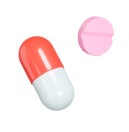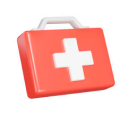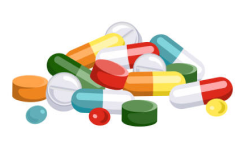Uses
What is Safe Handling of Oral Cytotoxic and Caution Medications for?
Medications under the “Cytotoxic” category interfere with division of body cells. Prolonged exposure or exposure to large amount of cytotoxic drugs can lead to serious harmful effects to the normal body cells e.g. blood cells and cells lining the stomach and intestines.
Medications under the “Caution” category are those which can cause health problems such as airway irritation, irregular heartbeat and in some cases, increase the possibility of abnormal development in embryo/fetus
These medications can be used to treat a variety of diseases. Exposure to these agents may cause irritation to the skin, eyes or mucous membrane. Hence, special precaution should be taken while handling cytotoxic/caution medications.
How should I take or use Safe Handling of Oral Cytotoxic and Caution Medications?
The tablets/capsules should be swallowed with some water and not chewed.
The dose prescribed may not always be one tablet or one capsule:
For tablets, sometimes it may be necessary to halve or quarter the tablet in order to obtain the correct dose for the child. In such cases, use a tablet-cutter. Always wear gloves and cut the tablets in a still-air room. Use separate tablet cutters for cytotoxic and non-cytotoxic medications. (Please refer to the information below for more specific instructions)
For capsules, it may be necessary to open the capsules in a still-air room and dissolve the contents in water before administration. Always wear gloves and mask. (Please refer to the information below for more specific instructions)
- Do not crush the tablet or the capsule, as this may cause small particles to be released into the air. Breathing in or coming into contact with these particles can cause harmful effects to the body cells.
- If the child is unable to swallow the required tablet/capsule OR specific doses are required, please refer to the table below for guides on administration.
For tablets:
| For capsules: If you need to open a capsule, you need to take extra care not to inhale the powder.
|
| It is best to dispose the plastic medicine cup and syringe after each use. However, if you wish to re-use these items, always wash them separately from other household dishes. You may reuse the syringe and plastic cup to handle the same oral cytotoxic/caution medication, but do not use them for any other purposes. | |
Precaution
What precautions should I take when taking or using Safe Handling of Oral Cytotoxic and Caution Medications?
Do not handle these medications with your bare hands. Always wear a pair of disposable gloves when handling the tablets/capsules/syrups.
Wash your hands thoroughly before and after handling these medications.
Avoid handling these medications if you are pregnant or think you may be pregnant or are breastfeeding
Handling
How should I store Safe Handling of Oral Cytotoxic and Caution Medications?
- Keep away from children
- Keep in a cool, dry place, away from direct sunlight
- Store the medication in the orignal container it came in.
How do I throw away Safe Handling of Oral Cytotoxic and Caution Medications safely?
Any excess tablets/capsules/syrups should be returned to the hospital for disposal.
Double-bag the empty pill containers / oral syringes / syrup bottles before disposal with household waste.
How should I handle Safe Handling of Oral Cytotoxic and Caution Medications safely?
In case of accidental exposure, this is what you should do:
| Route of exposure | What to do |
| Direct contact via skin, eye or mucous membrane. | Wash the area of contact thoroughly, with plenty of water. |
| Inhalation of aerosols and powders. | Seek medical attention immediately. |
| Accidental spillage. |
|
| Contamination of surfaces with child’s vomitus, faeces and urine. |
|
Disclaimers
If you take more than the recommended dose, please seek medical advice immediately. The information provided on this page does not replace information from your healthcare professional. Please consult your healthcare professional for more information.
This article is jointly developed by members of the National Medication Information workgroup. The workgroup consists of cluster partners (National Healthcare Group, National University Health System, and SingHealth), community pharmacies (Guardian, Unity, and Watsons), and the Pharmaceutical Society of Singapore. The content does not reflect drug availability and supply information in pharmacies and healthcare institutions. You are advised to check with the respective institutions for such information.
Contributed by
Last Updated on October 2017

Need More Medicine?
Use Medicine Order Service on HealthBuddy.

Medicines Reminder
Get reminders and chart progress on HealthBuddy.




















